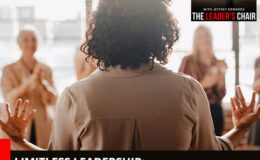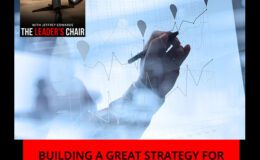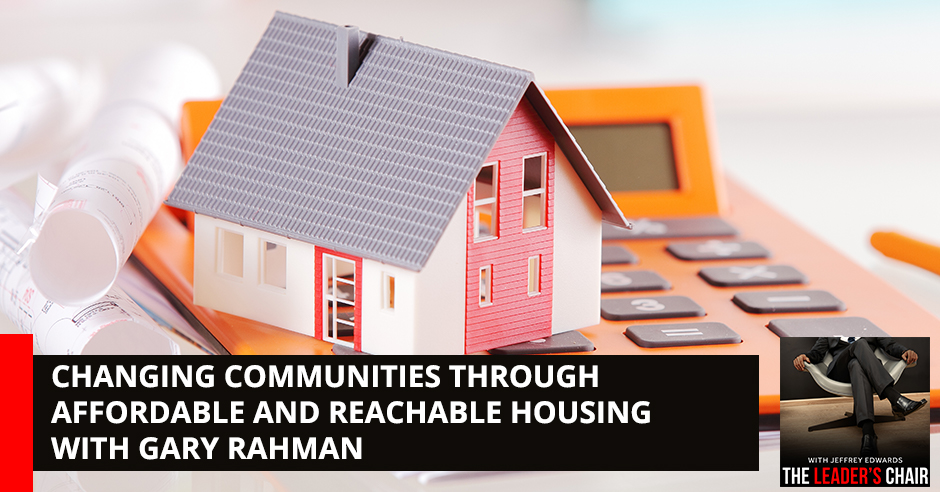
Everyone should have access to stable and affordable housing. Making it his mission, Gary Rahman founded a successful residential and commercial real estate company in Washington, D.C., where he is transforming communities by developing housing for low to medium-income families.
In this episode, I speak to Gary about why he believes housing is key to establishing wealth in a nation, and why community is the connection to our soul.
Check out this episode if you want to learn:
- Why investing in your community is the most important thing you can do
- How to find mentorship anywhere, anytime
- What real philanthropy looks like
🎧 Listen to the podcast here:
Changing Communities Through Affordable And Reachable Housing With Gary Rahman
How do you do what you do every day?
It starts with purpose. Being a native of Chicago, Illinois, I was the youngest of three, raised us in a single-family household. My mother suffers from depression, and (I was) raised on welfare. By the time I was 10 years old, we’d been evicted over 12 times. (With) unstable living conditions and transferring (to) a number of schools, I made a promise at a young age that this wouldn’t happen to me and my family — (that) I’d be able to help others in (similar) situations, and that one day I’d be a multimillionaire.
At the time, I was going to the first-grade level in special ed. Statistically speaking, I should be either in jail or dead, but I didn’t know those statistics, so I pursued real estate investing and development. I (focused) primarily on low to medium-income families, because I want to provide stable housing for others. I think that that is one of the pillars of the community, of establishing wealth in this nation. It should be something that’s affordable, reachable, and attainable for everyone.
You’re providing support to families, as well investing in real estate properties. How do you work with clients and stakeholders?
I read Andrew Carnegie’s book, (and) was (fascinated by) his perspective of capitalism. He was one of the wealthiest men in the late 1800s and 1900s, (and) believed that the only reason why he was successful was because of labor, (s0) he wanted to ensure that the people who helped were compensated, and that their families were in good shape after they retire. He also believed in not dying rich, (and) setting up different philanthropic things so that others could benefit from that wealth.
'Displacing people doesn't help the community.' Click To TweetMy approach when it comes to businesses is similar. Displacing people is not helping the community. In the society we’re living in right now, I think it (causes) more division and heartache. Instead of gentrifying communities, how can we build communities so that all people have a stake? That’s been my approach.
As a developer and investor, I look for opportunities. I want to make money, but I don’t think that it should be the primary objective. It gives me great pride to employ people, to provide a job opportunity (which) helps others as well.
How would your peers describe you, either as a business partner or an agent of change?
My wife gave me a Zoom surprise party, and I had 80-something people on the Zoom call. The outpouring of what they thought about me as a person, a businessman, a father and her husband was emotional. What many of them said is that I am someone who motivates them to be their best. I would hope that’s an attribute that I model more than (I) talk about. I think that it’s important to model certain behaviours that you want others to establish themselves.
In my business practice, I try to be a fair person. I want to push people to do their best work, to be someone who’s trying to invest in the community. When we think about philanthropy, oftentimes we get a little skewed. Sometimes we feel sorry for people, and no-one wants anyone to feel sorry for them. My approach in business and approach in philanthropy is one of service, but (also) one of mutual benefit.
I would hope that others see me as someone who respects people.
You mentioned Andrew Carnegie. Who are some of the other leaders or mentors who have influenced you?
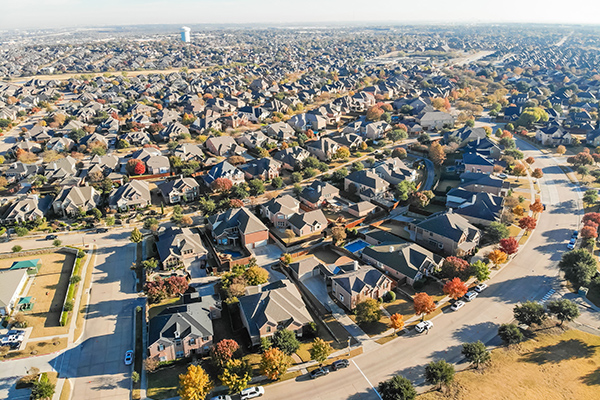
Affordable Housing: Housing is one of the pillars of establishing wealth in this nation, and it should be something that’s affordable and reachable for everyone.
My mother who didn’t have a high school diploma, but said that we could be whatever we imagined. Seeing her struggle with three children, and making some tough decisions so that we wouldn’t live in the housing projects — as a child, you wonder if it’s the right decision. You then become a parent and you realize the importance of those decisions that she made at the time.
I’ve had some amazing uncles, my childhood pastor and some amazing teachers who have been impactful in my life early on, and put me on a trajectory to be who I am now. I think of Reginald Lewis, Marcus Garvey and Elijah Muhammad – people who either were at the end of their lives, or not even alive for most of my life. The things that I’ve been able to study about them have been phenomenal, and how they invested so much time and energy into self-improvement.
What I find most interesting in speaking with successful leaders is that there is often someone local, who gets to know them at that grassroots level, and is an influence for them for the rest of their life.
I believe that we’re all leaders. We’re looking for somebody, but we can look in the mirror. I say that because the people that have been the most impactful in my life are not necessarily people that the world knows, or growing up, that even the whole community knew — but they were important to me.
I transferred from a lot of different schools growing up, and (one time) I moved to my grandmother’s neighbourhood. The school there — I didn’t know at the time — was one of the best in Chicago. I had some amazing teachers who noticed me. I had people who were investing real time, making sure I moved forward. In one year, my reading and math went up three and four years, respectively. That was nothing but them pouring into me, and letting me know that I was important and not invisible.
It doesn’t take Beyoncé, Jay-Z or somebody on television to inspire us. (At) my eighth-grade graduation, they asked me (to be) one of the keynote speakers. Afterward, my eighth-grade teacher tells me, ‘Gary, one day I’m going to read about you. You are going to be famous.’ Those words have stuck with me all my life. It wasn’t a famous person who told me that, it was my eighth-grade teacher. We start to also look at ourselves in the mirror and understand the value and the impact that we can have, not only in our households, but in our communities.
'The approach in business and approach in philanthropy is one of service and of mutual benefit.' Click To TweetBy people investing in you, it’s led to where you are now. What advice do you have for emerging leaders?
A major role is letting other people understand that they’re the leader they’ve been looking for. There may be others who are maybe more notable because they’re out in the public, (but) that doesn’t make them any greater a leader than someone who is unknown.
When I think of times past, you had common people in the neighbourhood who looked out for one another and inspired one another. We had teachers and plumbers, stay-at-home moms — they all played a role in that community. It’s no different now for me, and I believe in that wholeheartedly. I finished reading The Jewish Phenomenon, and that was the takeaway as well.
I have a mantra: I tell people if they want to talk politics before they cross our threshold, they need to be banking Black, buying a certain percentage from other Blacks, and building for Black coffers. These are three basic things, and we all can do it — it doesn’t take a political move, and we can at least establish those things. Then maybe (we) would have a stronger voice economically, politically, etc., (so) we could demand things in person, versus asking. It’s basic — it’s community. I believe in grassroots being the catalyst for all the things we want to see.
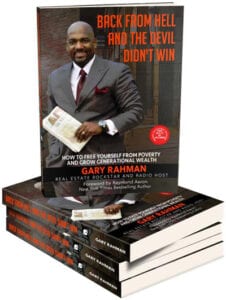
Back From Hell and the Devil Didn’t Win
How do you take all you’ve learned and share that with your kids?
My wife’s amazing. I believe in modelling and teaching, instead of preaching and teaching, so they see the example they want to live out. It’s easier to then speak on it, because they see you doing it. Our kids are known as the Stock-Up Kids: they’ve been traveling around the country, teaching others how to trade stocks. They’ve got merchandise, websites.
We have a lot of conversations as it pertains to business and service because oftentimes, you have many that will give subpar service, especially to a disenfranchised group of people. We have a different approach to that as well, as far as making sure that they’re giving 110%, especially to those who’ve been disenfranchised, (as well as) understanding the importance of their service, product, and the people that they serve.
It’s one of those things that you want to have a lot of conversations about, because you want them to feel comfortable with rebuttals and questions. You want to be able to have a dialogue.
I can imagine what the conversations would be like with their friends: ‘How’s your weekend?’ ‘I think Apple’s up to two points now, and IBM is looking good.’ It’s amazing to see what they’re doing — it’s a credit to you and your wife. You’re also the author of Back From Hell and the Devil Didn’t Win, about the path you’ve taken in your life. What was your inspiration behind this book?
A mentor (gave me the idea). I like to listen to those who are more successful than me! As I began to delve into the book, it became therapeutic, because there were things that I had buried deep, that I had forgotten about, that came out of me writing the book. The more that certain things came up in me, the more I felt more inspired to be even more transparent.
I figured there were probably others who were struggling (and) needed to hear that, and hear it in real, plain language. For the most part, there are some good takeaways, like struggles at a young age to hit my pinnacles, and still having some downsides, (and) then come-backs. I think there’s a lot that people can take away from the book.
'Look at yourself in the mirror and understand the value and impact that you can have in your community.' Click To TweetYou mentioned earlier that we can still learn from those who are no longer with us, through their books, speeches, videos.
One of my favourites is Napoleon Hill. I’ve read his books, (and) the one that inspired me (was) Outwitting the Devil. In the book, he’s having a conversation with the devil, and you almost feel like he (really is having a conversation) with the devil. It helped me a little bit when I was thinking about the title of my book.
There are mentors who can be inspirational long after they depart. We all have that capability.
What is the legacy of Gary Rahman? How would you like that to be defined?
There’s a lot left, but I will say that one of the main things that I hope (is) that if God were to take me out right now, people would know I loved hard, and I truly (wanted) to invest in people more than anything. The things that I’ve shared with others and my children, I would hope that they would continue to duplicate that with others. That would be right now, (but) I know I have more time.
📌 Important Links:
- Gary Rahman
- ‘Back From Hell and the Devil Didn’t Win‘ by Gary Rahman
- ‘The Jewish Phenomenon: Seven Keys to the Enduring Wealth of a People’ by Steven Silbiger
- ‘Outwitting the Devil’ by Napoleon Hill
Love the show? Subscribe, rate, review, and share!
Join The Leader’s Chair Community today on Facebook and Twitter.

